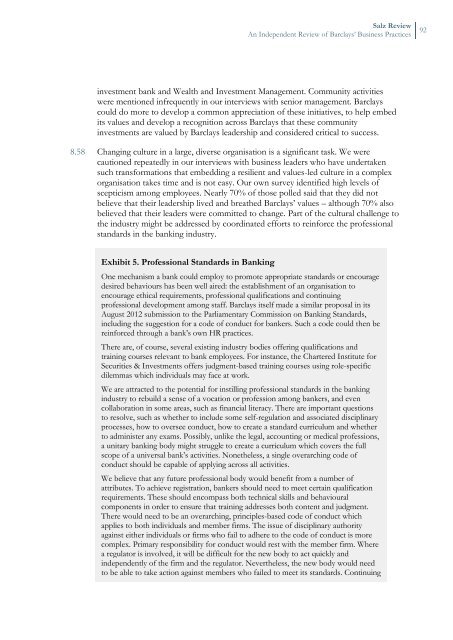Salz Review - Wall Street Journal
Salz Review - Wall Street Journal
Salz Review - Wall Street Journal
You also want an ePaper? Increase the reach of your titles
YUMPU automatically turns print PDFs into web optimized ePapers that Google loves.
<strong>Salz</strong> <strong>Review</strong><br />
An Independent <strong>Review</strong> of Barclays’ Business Practices<br />
92<br />
investment bank and Wealth and Investment Management. Community activities<br />
were mentioned infrequently in our interviews with senior management. Barclays<br />
could do more to develop a common appreciation of these initiatives, to help embed<br />
its values and develop a recognition across Barclays that these community<br />
investments are valued by Barclays leadership and considered critical to success.<br />
8.58 Changing culture in a large, diverse organisation is a significant task. We were<br />
cautioned repeatedly in our interviews with business leaders who have undertaken<br />
such transformations that embedding a resilient and values-led culture in a complex<br />
organisation takes time and is not easy. Our own survey identified high levels of<br />
scepticism among employees. Nearly 70% of those polled said that they did not<br />
believe that their leadership lived and breathed Barclays’ values – although 70% also<br />
believed that their leaders were committed to change. Part of the cultural challenge to<br />
the industry might be addressed by coordinated efforts to reinforce the professional<br />
standards in the banking industry.<br />
Exhibit 5. Professional Standards in Banking<br />
One mechanism a bank could employ to promote appropriate standards or encourage<br />
desired behaviours has been well aired: the establishment of an organisation to<br />
encourage ethical requirements, professional qualifications and continuing<br />
professional development among staff. Barclays itself made a similar proposal in its<br />
August 2012 submission to the Parliamentary Commission on Banking Standards,<br />
including the suggestion for a code of conduct for bankers. Such a code could then be<br />
reinforced through a bank’s own HR practices.<br />
There are, of course, several existing industry bodies offering qualifications and<br />
training courses relevant to bank employees. For instance, the Chartered Institute for<br />
Securities & Investments offers judgment-based training courses using role-specific<br />
dilemmas which individuals may face at work.<br />
We are attracted to the potential for instilling professional standards in the banking<br />
industry to rebuild a sense of a vocation or profession among bankers, and even<br />
collaboration in some areas, such as financial literacy. There are important questions<br />
to resolve, such as whether to include some self-regulation and associated disciplinary<br />
processes, how to oversee conduct, how to create a standard curriculum and whether<br />
to administer any exams. Possibly, unlike the legal, accounting or medical professions,<br />
a unitary banking body might struggle to create a curriculum which covers the full<br />
scope of a universal bank’s activities. Nonetheless, a single overarching code of<br />
conduct should be capable of applying across all activities.<br />
We believe that any future professional body would benefit from a number of<br />
attributes. To achieve registration, bankers should need to meet certain qualification<br />
requirements. These should encompass both technical skills and behavioural<br />
components in order to ensure that training addresses both content and judgment.<br />
There would need to be an overarching, principles-based code of conduct which<br />
applies to both individuals and member firms. The issue of disciplinary authority<br />
against either individuals or firms who fail to adhere to the code of conduct is more<br />
complex. Primary responsibility for conduct would rest with the member firm. Where<br />
a regulator is involved, it will be difficult for the new body to act quickly and<br />
independently of the firm and the regulator. Nevertheless, the new body would need<br />
to be able to take action against members who failed to meet its standards. Continuing
















